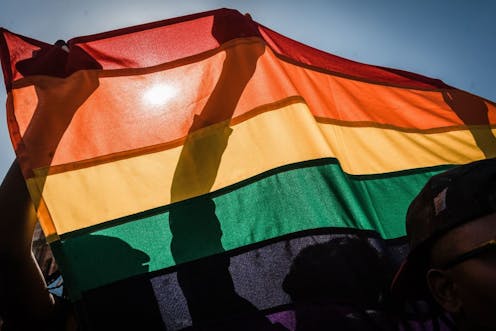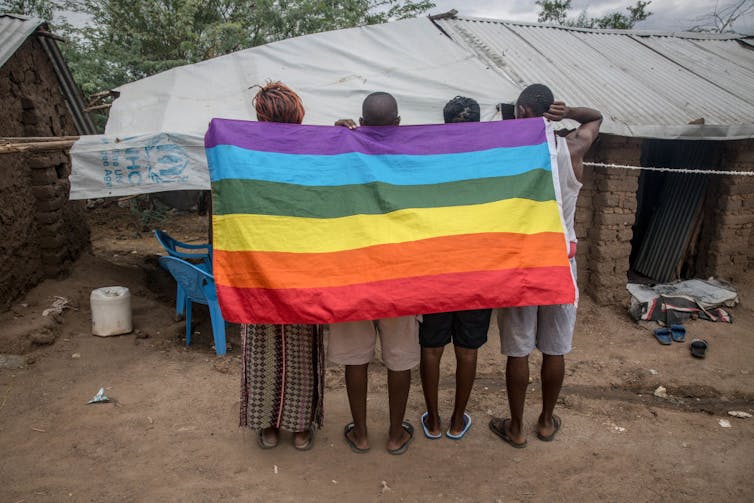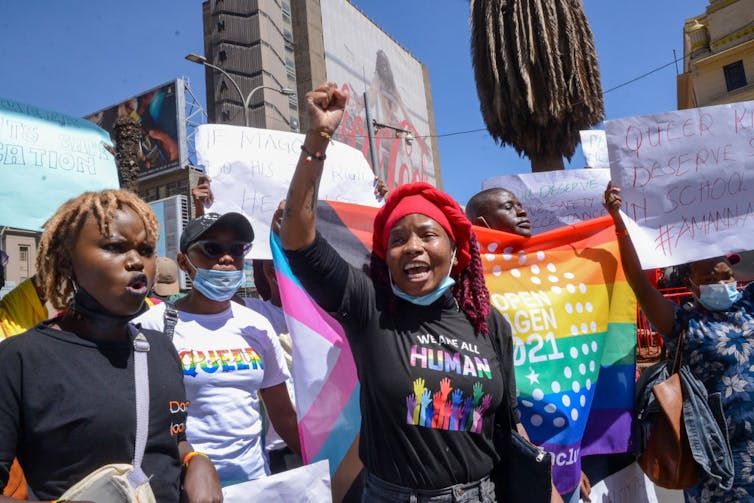
In recent years several African countries have decriminalised same-sex relationships. But they’re not representative of the continent. In fact, queer rights at times appear to be eroding in much of the continent, with Kenya and Uganda most recently in the news for harsh laws and violence against members of the LGBTIQ+ community. We asked sociologist and queer studies scholar Zethu Matebeni five questions.
How would you describe the state of LGBTIQ+ rights?
The state of LGBTIQ+ rights on the continent could be described as being on a continuum of seven possible stages, as suggested by US legal scholar Adam Kretz. These move from total marginalisation to cultural integration. The position in the continuum is determined by a country’s laws and its political, social and cultural conditions.
There are countries – such as Nigeria, Mauritania, Sudan, and Somalia – that impose bans, lengthy jail terms, ostracism, or a death penalty on anyone displaying same-sex affection and lesbian, gay or transgender identity or existence. Most countries – such as Algeria, The Gambia, Malawi, Tunisia, Uganda, Zambia and Zimbabwe – remain in the second stage of the continuum, maintaining criminalisation of LGBTIQ+ persons.
There are also a number of African countries – such as Angola, Cape Verde, Gabon, Cote d'Ivoire, Lesotho, Rwanda, to name a few – that have reached the third stage of decriminalisation of non-heterosexual sexuality. This makes it possible for LGBTIQ+ persons to attain rights and work towards changing societal attitudes.
Only a handful of countries – such as Mauritius, Botswana, Mozambique, Seychelles and South Africa – have codified their laws to make sure that LGBTIQ+ people are protected against discrimination.
À lire aussi : There's a growing gap between countries advancing LGBTQ+ rights, and those going backwards
Although no African country has reached the end of the continuum – cultural integration – there are some that are trying to establish positive rights and full legal equality.
Non-heterosexual acts have always been part of the African fabric and ways of being. Colonial laws have ensured they are considered un-African, against the order of nature and criminal.
Where is it safest to live as a queer person – on paper?
Queer people are everywhere and try to create safe spaces for themselves wherever they are. Safety is not only about what rights exist on paper. It’s also about social conditions and attitudes of others about LGBTIQ+ people in that society.
Take South Africa as an example. It might be easy to say it’s safer, on paper, to live there because of its laws and the rights given to LGBTIQ+ persons. But the reality may be different. Racial discrimination, economic insecurity, being considered a foreigner, sexual violence and many other factors contribute to making a place unsafe.
The country’s high rates of femicide and sexual violence against women, girls and queer persons make it an unsafe place to live as a black and African queer person.
Similarly, while South Africa may be ahead of others in the continent because of laws which allow a person to change their sex, these laws still carry certain conditions. These make it difficult for many transgender and intersex persons to live their full lives.
Where is it least safe?
In over 30 countries in Africa LGBTIQ+ people would face imprisonment. It is difficult to live in a place where you are not wanted and constantly face arrest, violence, torture and persecution.

Uganda has just signed into law the most extreme legislation against the LGBTIQ+ community, the Anti-Homosexuality Bill. This imposes the death penalty, life imprisonment or between 10 and 20 years in prison for “attempted homosexuality” and “promotion of homosexuality”.
Why do these rights matter?
LGBTIQ+ rights matter because they are fundamental human rights that ensure that every person is treated with dignity and respect regardless of their sexual orientation, gender identity, or expression. Ensuring that LGBTIQ+ individuals have access to basic human rights such as the right to freedom of expression, assembly, and association promotes democracy, heterogeneity, social justice and equality.
LGBTIQ+ rights matter because they recognise that everyone has the right to live their lives without fear of harassment, violence or persecution. With these rights it would be possible to fight discrimination, inequality and injustice in many societies while ensuring that everyone benefits from full access to rights.
What needs to be done about it?
Legal, cultural, social, political and economic barriers would need to be lifted to advance LGBTIQ+ rights and promote greater inclusion. For many countries that are still in the first and second stage of the continuum, legal reform would need to be prioritised.

Cultural and social factors to be addressed would include educating the public about diversity and difference.
Activists are already doing a lot, some with limited or no resources. Support of activist initiatives and organisations working on LGBTIQ+ issues, health issues, gender equity, advocacy for equality and social justice would need to be strengthened. This would ensure that these activities speak directly to policy issues.
Other African countries need to put pressure on the Ugandan government to stop its deadly new bill. It’s possible that whatever gains have been made elsewhere would be threatened by the actions of parliamentarians and homophobic citizens in Uganda. It has been noted that US Christian fundamentalists have been behind anti-homosexuality bills in west African countries, under the guise of protecting the family. These ideologies are spreading and fuelling deep hatred, promoting harmful conversion therapies for LGBTIQ+ persons. Religious ideologies could have spill-over effects in other African countries.
À lire aussi : Africa's policies hold key to LGBT rights on the continent: here's how
The battleground has shifted. Queer Africans, together with their governments, have to show their resilience and resistance against the neocolonial power dictating how life and family should be experienced in Africa.
This article was updated to reflect developments in Uganda.
zethu Matebeni is the South African Research Chair in Sexualities, Genders and Queer Studies funded by the National Research Foundation. zethu is affiliated with Gala, a queer archive based in Johannesburg.
This article was originally published on The Conversation. Read the original article.







